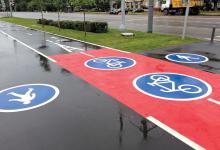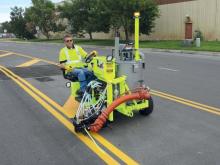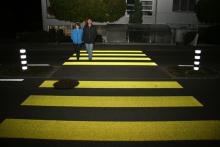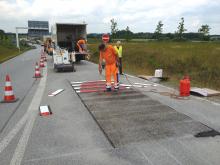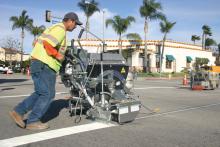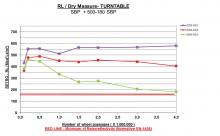Innovative roadmarking technologies will increase productivity, improve conspicuity in poor conditions and offer increased wear life - Mike Woof writes. Major advances have been seen in roadmarking systems now being offered on the market. More sophisticated machinery will increase productivity and quality when installing markings, while new systems will also last longer in use. In addition, smart technologies can detect wear and provide highway authorities with an accurate picture of network safety, at comp
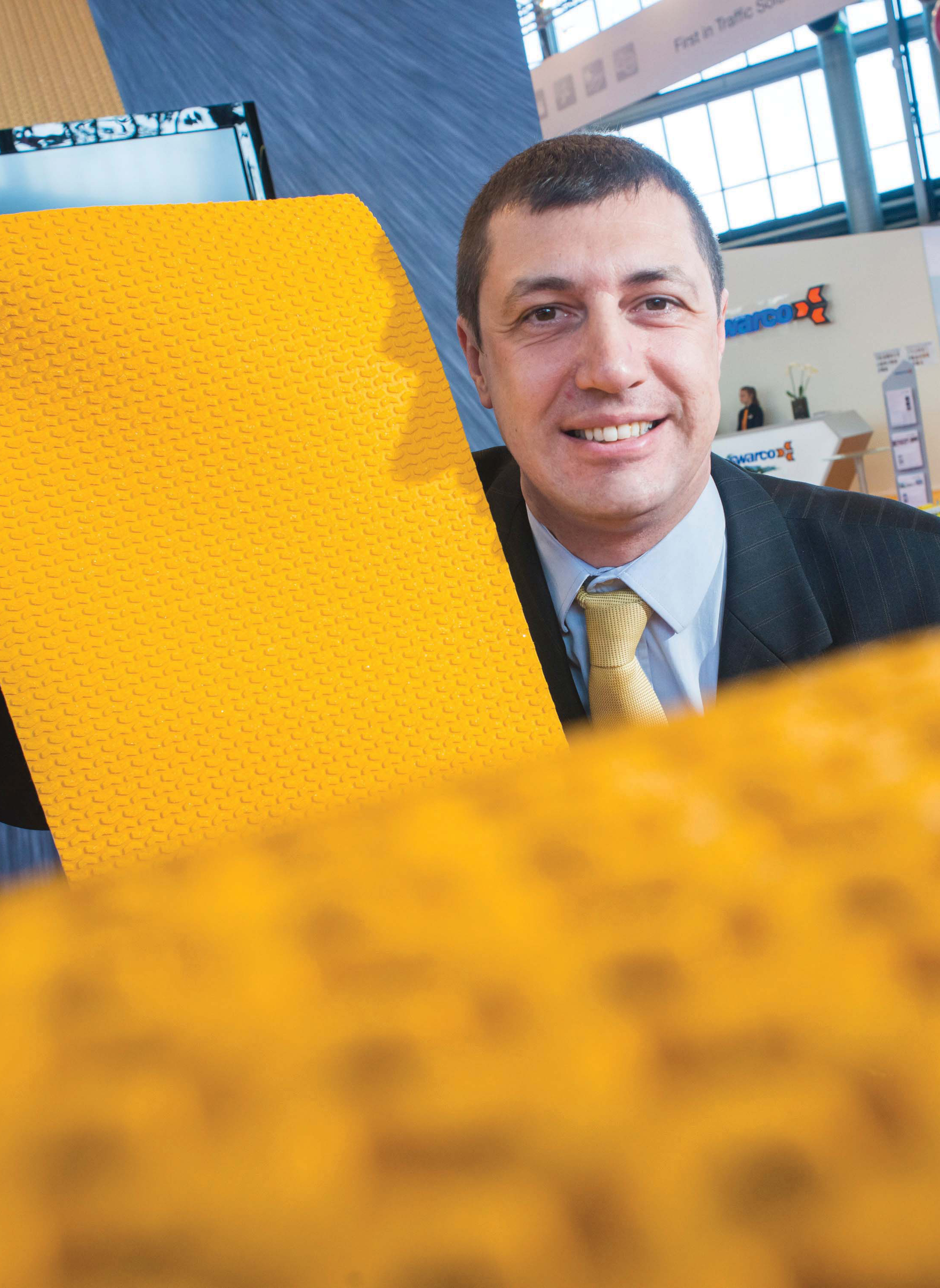
Snoline’s new tapes are said to be easy to install and highly durable
Innovative roadmarking technologies will increase productivity, improve conspicuity in poor conditions and offer increased wear life - Mike Woof writes
Major advances have been seen in roadmarking systems now being offered on the market. More sophisticated machinery will increase productivity and quality when installing markings, while new systems will also last longer in use. In addition, smart technologies can detect wear and provide highway authorities with an accurate picture of network safety, at comparatively low cost.
Danish company173 Borum continues to widen its international presence and is now developing sales in North America as well as Latin America and Africa. Machines have recently been supplied to Uganda, Kenya and Nigeria. An array of types is now available from the company including compact units, towed machines and larger models for use on motorway and highway jobs. Versatility, durability, productivity and reliability are claimed for Borum’s range of roadmarking machines, which are also designed for a wide array of working applications and material types.
Line painting equipment specialist2869 Graco is offering versatile new line painting technology with its latest LineLazer and ThermoLazer variants. The new LineLazer IV250DC has been improved so that it can spray two colours simultaneously. Peter Thomassen is in charge of product marketing and said, “With the first model you only had one pump so you could only spray one colour. For this one we added a second pump and split the hopper in two, so you can put two colours in there. It’s aimed at municipalities that want to paint dual colours or for use on airports.”
The machine reduces the time needed for painting as the equipment can spray two colours at once. This allows airports to spray black alongside the white to highlight runway markings, or means that parking firms can have two colours for denoting special areas. Thomassen said, “You need some practice to set the sprayers up as you don’t want to overlap the colours.”
A new control panel allows the operator to program the machine so that it will automatically apply striping or paint to a specified thickness, while the machine has twin bead tanks for reflective bead application. The self-propelled machine features a hydrostatic drive with power from a2288 Honda engine and Thomassen said, “You can stand on it and drive the unit.”
Also new from the company is the low cost ThermoLazer 200TC, which broadens the firm’s range of thermoplastic striping machines. Developed as a more basic alternative to the existing thermoplastic application equipment, the machine has a 90kg thermoplastic hopper as well as a gravity feed bead tank.
Belarus-based7822 STiM says that its new Kontur 650HPE Spray roadmarking machine offers high productivity and reliability as well as a sophisticated control system. With this laser-guided automatic control, the machine can detect where markings have degraded and apply new markings only where required. The machine is offered mounted on a self-propelled chassis with hydrostatic drive and can produce a single solid line with a width of 150mm at 800grammes/m2 at a rate of 4.2km/h. For double solid lines each 150mm wide and again using 800grammes/m2 of paint, the machine has a productivity of 2.1km/h. Maximum roadmarking speed is 5.6km/h, while top transport speed is 12km/h and the machine is powered by a 299 Perkins diesel delivering 45kW. The machine is equipped with twin tanks each with capacities of 300kg, as well as a 100kg capacity tank for glass beads and a solvent tank capacity of 15litres. The Kontur 600HP can be used to spray cold two-component plastics or conventional traffic paint while its compact size and ar
ticulated chassis means it can operate in compact urban locations as well as being used for highway marking jobs.
Also new from STiM is the LIS, a trailer-mounted machine designed for automatic restriping of old roadmarkings. The unit weighs in at 750kg in its trailer and can be towed at speeds from 3-12km/h for restriping purposes, while it will scan a zone up to 600mm wide. Fitted with three video cameras, the LIS unit has two pairs of paint guns and can restripe centreline or road edge markings.
US firm7821 MRL is offering a new system that can deliver grooved in road markings for extended wear life on roads in areas where winter conditions are severe. The machine cuts a groove using a diamond blade and then applies the paint. A spokesperson said, “It’s then protected against snowploughs.”
The material cut from the roadway is removed automatically and can then be taken away for recycling. The spokesperson said, “In the US we can put thermoplastic in the groove or 3M tape, or you can use a two-part epoxy.”
While units for grooving have been around on the market for 10 years or so, MRL claims its machine is more sophisticated as it provides a very precise level of depth control. This ensures that the grooves are neither too deep nor too shallow, reducing the risk of bumps in the roadway or undue wear respectively. A camera system is also fitted, making the machine easier to operate while the paint guns are controlled by computer.
Two new temporary road marking tapes are being offered by safety specialist333 Snoline. Part of 2438 Lindsay Transportation Solutions, Snoline says that its new TEMPOLINE and PROFILINE products are easy to install and offer high conspicuity.
The TEMPOLINE WR HP14 product features a flexible rubber layer that is reinforced with polyester fabric, allowing it to be removed easily. The upper surface structure and special glass beads are said to provide high visibility in all climactic conditions, particularly at night and in wet weather. The product is said to offer high visibility for duties in traffic deviations and temporary symbols around construction zones.
The product is available in various widths and contains no harmful material, allowing it to be used in environmentally sensitive areas. The tape and primer has to be stored in a cool, dry indoor facility and has to be used within 18 months from delivery. Ease of application is claimed and roads can be opened to traffic as soon as it is installed.
Meanwhile the PROFILINE T 14 tape shares the same high visibility in all conditions but is designed to offer high durability due to its special polymer construction and can be used in workzones for 6-12 month periods.
Major advances have been seen in roadmarking systems now being offered on the market. More sophisticated machinery will increase productivity and quality when installing markings, while new systems will also last longer in use. In addition, smart technologies can detect wear and provide highway authorities with an accurate picture of network safety, at comparatively low cost.
Danish company
Line painting equipment specialist
The machine reduces the time needed for painting as the equipment can spray two colours at once. This allows airports to spray black alongside the white to highlight runway markings, or means that parking firms can have two colours for denoting special areas. Thomassen said, “You need some practice to set the sprayers up as you don’t want to overlap the colours.”
A new control panel allows the operator to program the machine so that it will automatically apply striping or paint to a specified thickness, while the machine has twin bead tanks for reflective bead application. The self-propelled machine features a hydrostatic drive with power from a
Also new from the company is the low cost ThermoLazer 200TC, which broadens the firm’s range of thermoplastic striping machines. Developed as a more basic alternative to the existing thermoplastic application equipment, the machine has a 90kg thermoplastic hopper as well as a gravity feed bead tank.
Belarus-based
ticulated chassis means it can operate in compact urban locations as well as being used for highway marking jobs.
Also new from STiM is the LIS, a trailer-mounted machine designed for automatic restriping of old roadmarkings. The unit weighs in at 750kg in its trailer and can be towed at speeds from 3-12km/h for restriping purposes, while it will scan a zone up to 600mm wide. Fitted with three video cameras, the LIS unit has two pairs of paint guns and can restripe centreline or road edge markings.
US firm
The material cut from the roadway is removed automatically and can then be taken away for recycling. The spokesperson said, “In the US we can put thermoplastic in the groove or 3M tape, or you can use a two-part epoxy.”
While units for grooving have been around on the market for 10 years or so, MRL claims its machine is more sophisticated as it provides a very precise level of depth control. This ensures that the grooves are neither too deep nor too shallow, reducing the risk of bumps in the roadway or undue wear respectively. A camera system is also fitted, making the machine easier to operate while the paint guns are controlled by computer.
Two new temporary road marking tapes are being offered by safety specialist
The TEMPOLINE WR HP14 product features a flexible rubber layer that is reinforced with polyester fabric, allowing it to be removed easily. The upper surface structure and special glass beads are said to provide high visibility in all climactic conditions, particularly at night and in wet weather. The product is said to offer high visibility for duties in traffic deviations and temporary symbols around construction zones.
The product is available in various widths and contains no harmful material, allowing it to be used in environmentally sensitive areas. The tape and primer has to be stored in a cool, dry indoor facility and has to be used within 18 months from delivery. Ease of application is claimed and roads can be opened to traffic as soon as it is installed.
Meanwhile the PROFILINE T 14 tape shares the same high visibility in all conditions but is designed to offer high durability due to its special polymer construction and can be used in workzones for 6-12 month periods.

